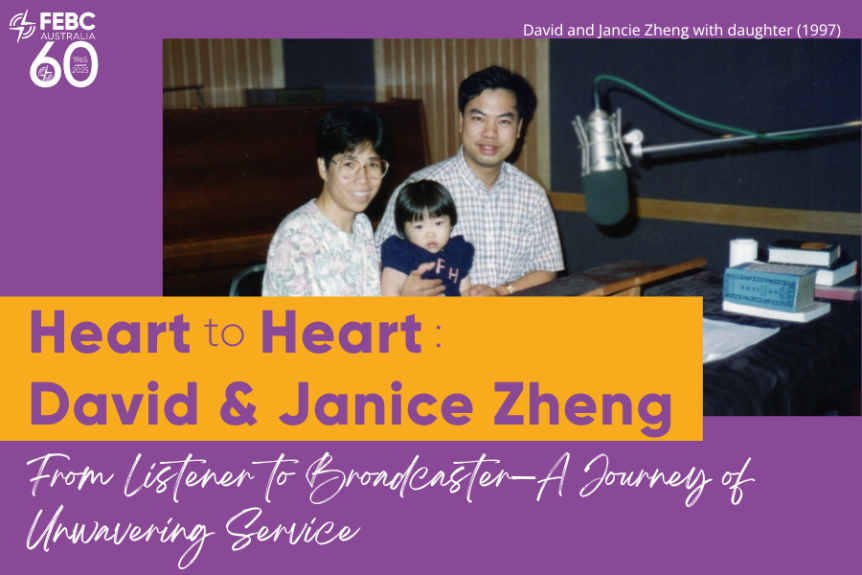In the days when churches were scarce in China, FEBC's Liang You Radio became a lifeline of faith for many, including one family whose story exemplifies the transformative power of radio ministry.
"When I grew up in China, there were no churches. My mother was the first generation in her family to become a part of God's family," shares former FEBC Australia missionary David Zheng. “I grew up listening to FEBC’s Mandarin shortwave Liang You Radio because my mother listened to it a lot. Many others listened to the radio by chance. Many came to the Lord through the radio. In my visits to Chinese churches in New South Wales, I often come across those who heard about Jesus through Liangyou Radio.” FEBC’s founding member received a handwritten Bible once from a listener who had copied the Bible from FEBC’s Bible dictation program.
Later, their home became a vital "transfer station" for listener letters that couldn't be sent directly from Hong Kong to mainland China.
When David migrated to Australia, he learnt about FEBC Australia and applied to join. In the time that many were leaving, David and his wife stepped into Hong Kong in 1996, just before Hong Kong was returned to China in 1997. He served as a Mandarin broadcaster in FEBC’s Liangyou Radio station and a teacher in Liangyou Bible College.
Missionaries: David and Janice Zheng
Dates of service: 1996-2012
Locations: Hong Kong, Australia
Role: Broadcaster and Teacher
Growing with the Chinese Church
It was also a time when China was growing rapidly, and so was the Chinese Church. “There were no other resources to teach the concept of missions and church operations in China, but our programs had already started to teach these to the Chinese churches, who started to practise the teachings. FEBC played a significant role in China’s missionary efforts,” David shared, with gratitude to God.
The ministry adapted to serve both house churches and registered churches, reaching an estimated eight million daily listeners. "It was almost the only spiritual resource for Chinese churches". For lay leaders in house churches, the impact was tangible. One listener revealed: "There are more than 100 house churches in our area, and half of them, about 60, listen to our radio... These preachers are more disciplined. If they don't listen, the church will be more chaotic."
As China transformed, Liangyou Radio evolved alongside its listeners, becoming a trusted companion through dramatic social changes. The transition from rural to urban Christianity presented unique challenges, which the broadcasts addressed with sensitivity and wisdom.
"Originally in the countryside, when listeners moved to the city, they had to be busy for a while, so they might lose contact... Later, when they settled down, they found us again and said they were very excited, saying, 'Oh, they've found home again.'"
Yet the station maintained clear boundaries: "We in FEBC have always maintained the principle of telling them that gospel radio is not a church. You should not regard gospel radio as a party's church. If you don't have a church for the time being, you can listen to the Kingdom for the time being."
The ministry's impact extended to mega-churches in major cities, where a unique challenge emerged. "In a city as big as Beijing... its worship service is every half an hour or so. There is an elevator. After the first session, you get off the elevator here and then go up again. Each session is 2,000."
These large churches relied heavily on volunteers for pastoral care: "Their pastoral work is handed over to volunteers. Each church has hundreds of volunteer lay leaders to do the specific pastoral work." FEBC responded by developing Liangyou Bible College, offering two-year training programs for lay leaders.
"We help these volunteers and give them two years of basic theological training. Then they can become small pastors and then go to pastor the other disciples. So we take care of both generations."
This adaptability —serving both house churches and registered congregations —demonstrated FEBC's commitment to supporting Chinese Christians wherever they gathered. The ministry carefully navigated potential tensions: "We have to be very cautious because there are some disharmonious points between the house church and the registered church. We have to handle them carefully. But we believe that both sides are still very helpful."





